02-06-2020
Volunteer tourism in Nicaragua: differences between organizational models
Angélica Picado Duarte & Marta Salvador | Alba SudVolunteer tourism in Nicaragua shows different management and organization models with actions aimed at promoting social projects in the communities. Even so, the arrival of COVID-19 has left a state of uncertainty about the future of this phenomenon.

Photography by: Volunteer tourism in Nicaragua. Photo by: Angélica Duarte
Volunteer tourism or voluntourism is a phenomenon that encompasses all those tourists who, for various reasons, as we explained in this previous article, find a new way of traveling that involves volunteering in a community. Usually, these tourists are young women between 16 and 22 years old who come from the Global North and travel to the Global South through multiple organizations that manage volunteer programs. This phenomenon, which has grown in popularity by tourists and organizations, has also caught the attention of the media and academics who, for just over two decades, have investigated the dynamics of volunteer tourism. One of the focuses of attention has been the impacts of voluntourism both on volunteers and local communities, as reflected in this article by Alba Sud. Although its complexity has highlighted the positive and negative effects of this practice, there are many experiences of volunteering around the world and each has different characteristics.
Among these characteristics, the type of organization that manages volunteering stands out. Historically, voluntourism was initiated through religious organizations or NGOs as solidarity practices of international action. However, although these organizations continue to work in this area, in recent years there has been a proliferation of commercial-type organizations, especially located in developed countries. In order to delve into this axis of voluntourism, this article explains five experiences of volunteer tourism in Nicaragua with the hypothesis of whether organizational models can change the experience of voluntourism. The different analysed types are an international organization, university organization together with community management, international cooperation, religious foundation and community management through an association.
Despite the fact that volunteer tourism is a very specific and specialized market niche, it is also affected in terms of the uncertainty of how the COVID-19 pandemic has suspended all kinds of tourist practices. Although at first glance it may have a very negative impact on this type of tourism, it also opens up an opportunity to rethink the different models that underpin voluntourism and the sector in general.
The phenomenon of voluntourism in Nicaragua
Volunteer tourism has diverse expressions within Nicaraguan society. In the case of rural areas, experiences promoted by specialized agencies dedicated exclusively to this type of tourism have been observed, which have been managed by international agencies, educational institutions, cooperation agencies, religious foundations, or civil society organizations from within Nicaragua. Despite the fact that there are no statistics from the Nicaraguan Tourism Institute, according to the information that community centres collect, volunteers who arrive in Nicaragua are mainly from Canada, the United States, Spain, Germany and France. In certain cases, volunteers do the application process by themselves and in other cases through specialized organizations that offer this type of experience.
Volunteer tourists in Nicaragua are usually inserted in social projects linked to community issues such as water sanitation, general medical care, improvement of school infrastructure, comprehensive educational training, healthy nutrition, projects with gender and socio-environmental perspective. Likewise, their work is connected with women's groups, environmental organizations, schools and the general population.
International organization: International Youth Challenge
International Youth Challenge (RJI) is a non-profit NGO that was created in 1991, forming a strategic alliance with Canada, Guyana and Australia to promote community development in the countries that need it most. Initially, they settled in Costa Rica, where their headquarters are located, but over the years they have expanded the countries in which they collaborate. Thematically, it has focused on three different areas: environmental conservation, education and community development, with an emphasis on children, women and indigenous communities. Among its programs is Nicaragua, where they implement projects based on environmental education, self -production, construction, improvement of kitchens, gender initiatives and women's empowerment and education infrastructure in rural communities. Specifically, the communities with which Reto Juvenil Internacional works today are located in Granada, León, Managua, Matagalpa and Somoto, where RJI is established for a period of 3 to 5 years. Once the community has been able to develop the project, in order to avoid the dependency of the communities on this organization, RJI continues its work in another locality.
In this case, the volunteer tourism organization in Nicaragua establishes the links with the community leaders. They are organized as a team to design all the activities to be carried out and identify the spaces of social incidence. According to an annual volunteer program, calls are launched according to the vacation periods of the countries of origin of the volunteers. Therefore, social action projects are promoted in communities with high levels of marginalization and social vulnerability, that is, in communities where they do not have piped water, homes do not have drainage, a population with high rates of illiteracy and with limited access to health.
For the tourists who decide to take this type of trip, Reto Juvenil Internacional offers several options for volunteering. First of all, there is the option of traveling on their own, that is, choosing the volunteer that best suits the needs and interests of the volunteer. Second, RJI offers the opportunity to organize a volunteer group of at least 12 people from a university or other organization to develop a project that meets the expectations of volunteers and communities. The fees for participation in a two-week volunteer program are $750 (€ 695) per person, including airport pick up and transportation to the project site. It also includes lodging and food (breakfast, lunch and dinner) in the community, orientation and training sessions about the project, participation certificate, 24-hour emergency service and a group leader available throughout the volunteering. Airfare and hotel reservations in case of flight delays, travel insurance, optional tours, laundry service and money for personal expenses are not included.
Another key thing to remember is that Reto Juvenil Internacional offers a program called “Spanish” that consists of learning or improving the Spanish language, delving into the country's lifestyle and volunteering with host families. This program is carried out in Costa Rica, where Spanish classes are taken for a minimum of one week and, for the following 7 days, voluntourism is carried out in any of the Central American countries where RJI works, including Nicaragua. The rates established for this type of program range from almost $1,000 (€ 926.50) per person for two weeks to $3,000 (€ 2,780) for eight weeks, including the same benefits mentioned above. Finally, Reto Juvenil Internacional offers the option of doing an unpaid international internship, which is a type of program offered by many international organizations today.
University organization together with community management: Asociación Puesta del Sol
On the other hand, this community organization is located on the island of Ometepe, department of Rivas, Nicaragua. They are organized since 2005 as a self-management initiative led by women as explained in this article by Alba Sud . This community is made up of 15 women and two men, between the ages of 33 and 65, who began this process of collective organization after the deterioration of the working conditions of the peasants with the processes of land privatization, lack of access to credit and meteorological phenomena that increased losses in agriculture. For this reason, with intensified conditions of poverty and inequality in the lives of women, they decided to create this association that began to offers community rural tourism. Today, its activity is divided into both the attention to visitors and the production of wine and jam made from the hibiscus flowers or so-called “jamaica flower”.
In addition to receiving tourists as part of its community rural tourism activity, Asociación Puesta del Sol also receives groups of volunteers from Canadian educational centres. The association manager is in charge of the relationship with the international student mobility programs of Canadian universities to volunteer once a year thanks to her dual citizenship (Nicaraguan and Canadian). Furthermore, an example of an institution they collaborate with is Ceged Limoiliou campus Québec, a professional studies campus in south-eastern Québec.
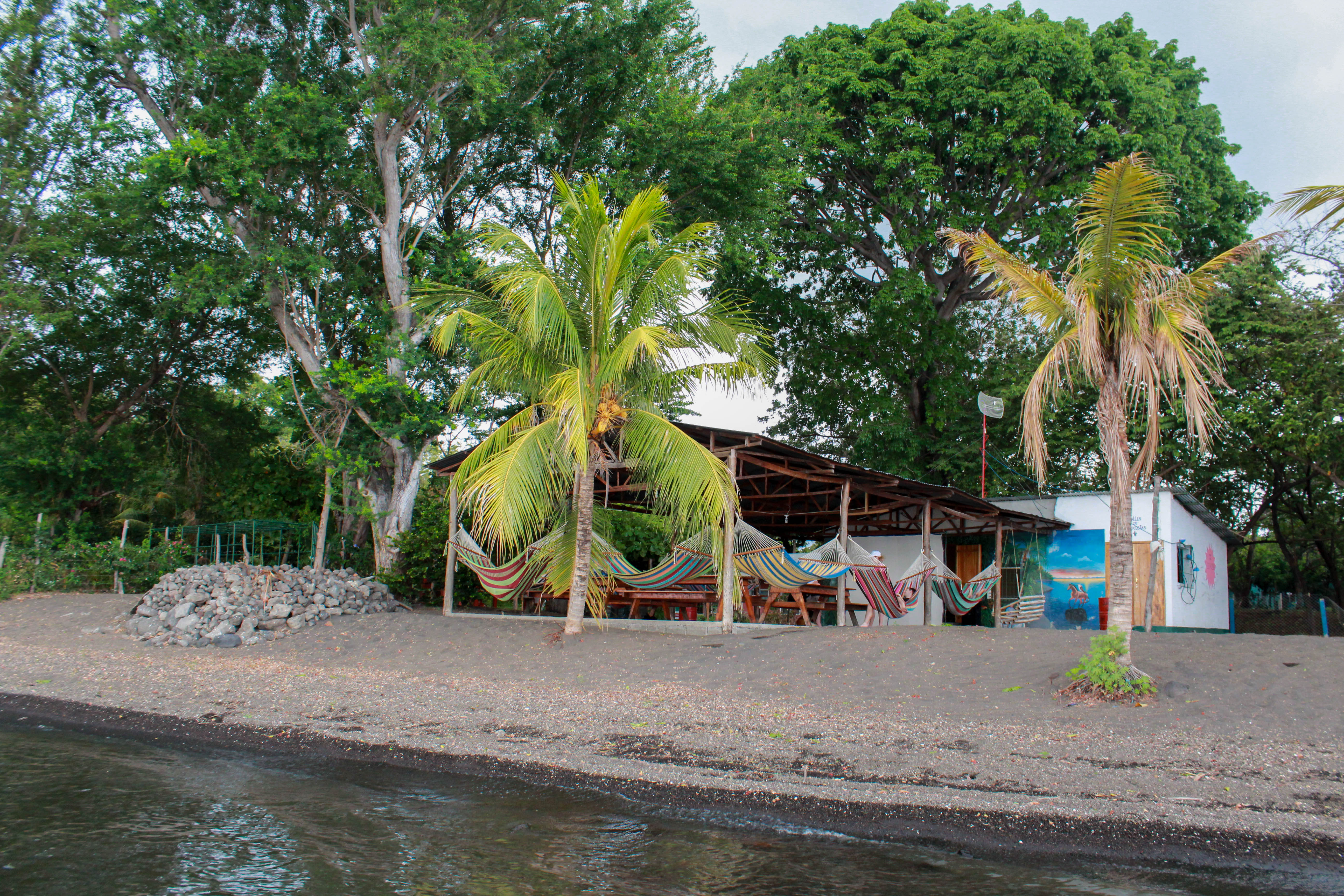
Asociación Puesta del Sol. Source: Tshantz, under creative commons licence.
Volunteers’ stays can vary from 8 to 15 days, with 5 hours of volunteer work per day where they provide medical care to the community members and distribute medications during the care hours, as an agreement between the two parties. This experience has gained value in the community since each year the arrival of this group of volunteers is expected, especially since the health system on the island suffers from enormous deficits. The volunteers pay the living expenses during their stay in the community; however, this is managed by the mobility program of their institution, which is in charge of making the corresponding payments directly with the administration of the Association.
The accommodation is in the family’s houses where they share all the feeding times. The day the volunteers arrive they are offered a welcome dinner that is prepared by the women of the community. The cost of accommodation is $10 (€ 9) per night and feeding includes dinner and lunch at $4 (3.6 €) and breakfast at $3 (€ 2,7). Income for each family varies depending on the number of students they received at their homes.
The social action project carried out by these volunteer programs is part of an initiative that has contributed in some way to improve the living conditions of communities in various areas. In the experience of Asociación Puesta del Sol, the volunteer tourism has contributed to making improvements of classrooms, in the construction of a playground, as well as the reactivation of the only elementary school library that exists in the community.
International Cooperation: Japan International Cooperation Agency (JICA)
International cooperation refers to the collaborative relationship established by state governments with entities from other countries, with special emphasis on collaborative relationships. Thus, many governments draw up lines of action linked to international aid by encouraging volunteer programs with other countries.
Volunteer tourism has also come to Nicaragua for educational purposes in the case of international cooperation agencies such as the Japan International Cooperation Agency (JICA). This Japanese agency annually enters a group of volunteers to carry out activities in various training areas, either as educators teaching Japanese language classes at the Central American University (UCA) or promoting community therapies for children with disabilities of the Los Pipitos Association, in Managua.
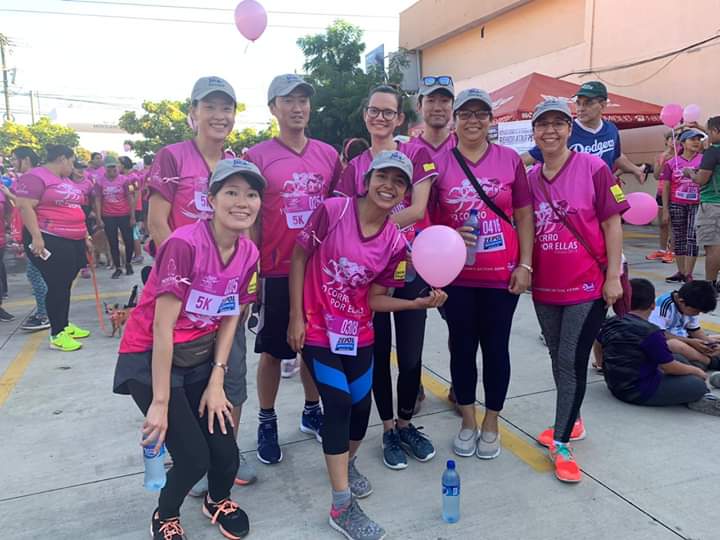
Volunteers of JICA Nicaragua. Source: Facebook of JICA Nicaragua.
In other words, young people between the ages of 20 and 39 participate in this Japanese volunteer program, as well as in the senior category, which refers to volunteers who have experience of more than 15 years in their areas of work. The program has a presence in 23 countries in Latin America and the Caribbean, including Nicaragua where the first group of volunteers arrived in 1991. Since then, there are more than 641 volunteers that the country has received.
For this particular program, the Nicaraguan institutions make the request specifying the profile of the volunteer they require. Then, they send the request to the JICA Nicaragua office that functions as the intermediary to transfer the information to the JICA central office in Japan. All applications are received in this office during the year for the recruitment and selection of candidates’ process. The length of stay of the volunteers in the program is from 10 months to 2 years.
The partner institutions in Nicaragua are responsible for providing the necessary resources to carry out on-site activities, and the JICA cooperation agency is responsible for airfare expenses from Japan, living expenses, and basic medical expenses. The volunteers live in independent residential houses since they are located in different parts of the country according to the corresponding mission. The volunteer program format is granted as a scholarship to foreign volunteers, where all expenses and credits are recognized in their study programs.
Religious organization: Fabretto Foundation
The Foundation Fabretto began to work in the 50s with the creation of the first children's home founded by Salesian Father Rafael María Fabretto, who promoted community development in San José de Cusmapa, a community impoverished and isolated in northern Nicaragua. Its volunteer activities seek to generate alternatives for Nicaraguan children and youth through education and food sovereignty programs in areas with high levels of marginalization. The organization serves more than 440 public schools and provides school accompaniment to more than 20.000 children and youth in 8 Fabretto Schools. These programs are focused on training educators and teachers to strengthen education in the stage of early childhood, as the implementation of programs of alternative rural high school, a daily school lunch as an alternative to encourage school attendance, accompany other initiatives such as school gardens and community training.
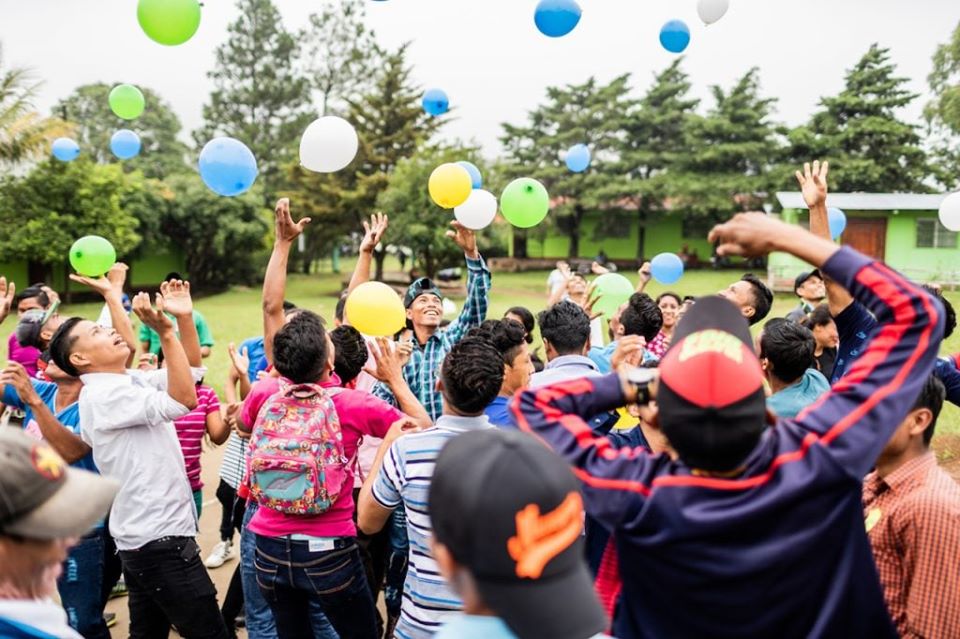
Volunteers of the Fundación Fabretto. Source: Facebook of Fabretto Children's Foundation.
There are different kinds of volunteering: individual, group and corporate, and each has different levels of incidence. Individual volunteering is focused on Spaniards and Americans who come to the organization to accompany processes of food sovereignty and nutrition, fundraising, education and the teaching of English as a second language. They usually work in different Fabretto centres located among the country regions. The cost of volunteering is $500 (€ 452) for a stay of three weeks, which is done during school dates of Nicaragua between February 15 and June 30. On the other hand, costs of accommodation, living expenses, airfare and international health insurance are covered by the volunteer, although the organization offered the information for the search for community housing.
In the corporate volunteering modality, Nicaraguan companies collaborate with a day of volunteer work together with their staff employed in an event scheduled by the organization. Like group volunteers, they are local people who dedicate a vacation period to collaborate with the foundation's activities, such as in the “pancitas llenas” (full bellies) program that fights to reduce hunger and poverty in rural Nicaraguan communities.
Community organization: Community of Santa Julia, El Crucero
In Nicaragua exists more localized experiences that work in communities where they have permanent volunteer projects. Such is the case of the Apapachoa Association in the Santa Julia community in El Crucero, a municipality in the department of Managua. Apapachoa comes from the Nahuatl language which means to embrace with the soul. This organization concentrates on various volunteer activities in four areas of community intervention: environmental education, organic agriculture, sustainable tourism, where the most important has been supplies and sanitation of water. These modalities range from young people with no previous experience who want to be inserted into community processes, to academics or researchers who want to get involved in specific projects in which the community works.
Volunteers help with the training of ecotourism guides, teaching techniques and management of the butterfly farm, basic English courses focus on the young people in the community in order to strengthen community participation and activate job employment in the same area. They have also collaborated in the construction of water wells and the construction of the Apapachoa eco-cultural centre, which opened in 2017 with the help of volunteers who enabled an abandoned building in the community.
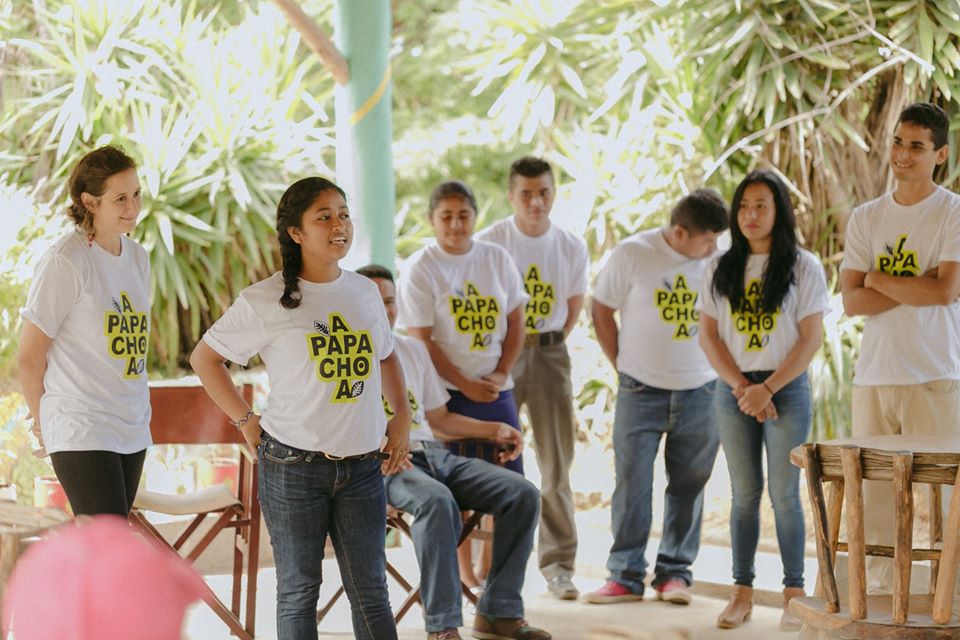
Volunteers of the Asociación Apapachoa. Source: Facebook of Apapachoa.
Currently, they have 7 permanent volunteers and 15 support volunteers, who participate in specific activities carried out by the foundation, with which they apply directly. The cost of volunteering per week in Apapachoa is $400 (€ 361), it covers accommodation, three meals a day, internet and transfer to the airport. In the case of personal expenses and health insurance as well of airfare are borne by the volunteer.
What is the voluntourism experience like for Nicaraguan communities?
The experiences of volunteer tourism are very different from each other, with all kinds of volunteers, communities, organizations and projects. The international organizations manage a very high number of volunteers and programs around the world, which requires very direct communication with the communities in order to identify their needs and implement the programs appropriately, without falling into the commercialization of this activity. In the case of university organizations together with community management, the fact that volunteers are students who can find themselves for the first time in a foreign country without their families or volunteering for the first time should be highlighted. Besides, organizations should be aware that volunteers may be primarily motivated to add this experience to their resume, regardless of the altruistic motivation to volunteer or the impacts it may have on the host community. Regarding international cooperation, this can be a good tool to strengthen relations between countries, as long as the intentions of both countries are of mutual benefit, with an impact on the communities that need it most. Moreover, religious foundations have been pioneers in international volunteering because of their presence around the world will towards the most vulnerable people. To this end, community organization represent one of the best management models of volunteer tourism because is the local population who leads the projects and first-hand knows what their needs are. Despite this, the attraction and selection of volunteers can be complicated without an intermediary organization (NGO, for example), but on the other hand, the communities do not depend on external agents, which sometimes causes negative impacts if they stop providing their resources.
This article has presented five experiences of voluntourism with different types of management, although in order to compare the practices and impacts in more detail. Nevertheless, a more in-depth analysis of each case and all the actors involved would be required.
A common characteristic of most volunteers is that each group is always accompanied by a coordinator who assumes the double role of translator and accompanying guide. In the case of language, it becomes a barrier to intercultural exchange, since most of the volunteers who come to Nicaragua come from Anglo-Saxon countries or do not have a sufficient level of Spanish to communicate effectively. The guide teachers are in charge of supporting the translation when some difficulties arise during the stay.
For instance, as the accompanying guide of an International Youth Challenge group warns: “Not all volunteers are sensitized to the realities of our countries. Some are young and when they arrive at the communities they are bothered by the sun, mosquitoes, even the crying of children in host homes (Personal communication, December 2018). Without a doubt, despite the information and recommendations provided by specialized organizations to groups of volunteers, the situation may vary during the experience. Thus, in some cases, tourists share and enjoy their stay in Nicaragua with the community members, but in other cases, the volunteers decide not to share their free time with the host families.
Another aspect highlighted by the local population is the fact that, for the host families, receiving the volunteers symbolizes a highly dedicated workday, since it is necessary to prepare the conditions within the home for their reception and, in some cases, they even have to make an effort to get the products they require for the arrival of the volunteers.
Nonetheless, tourism has many extensions that have not yet been fully explored or analysed. However, these volunteer tourism experiences generate a short-term alternative for the destination communities since there is not always a logical continuity, evaluation, or feedback of the real and concrete impact of these activities in the community. On the other hand, most of these projects are managed from the outside, making it difficult to respond to specific requests or needs from the communities. Even so, as we have seen, some experiences of voluntourism go hand in hand with the communities or are proposed by the local population so that the impact is as positive as possible. Finally, there is a risk of losing the opportunity to generate synergies and join efforts in order to generate a reciprocal lasting impact beyond feeding the individual experiences of the volunteers.
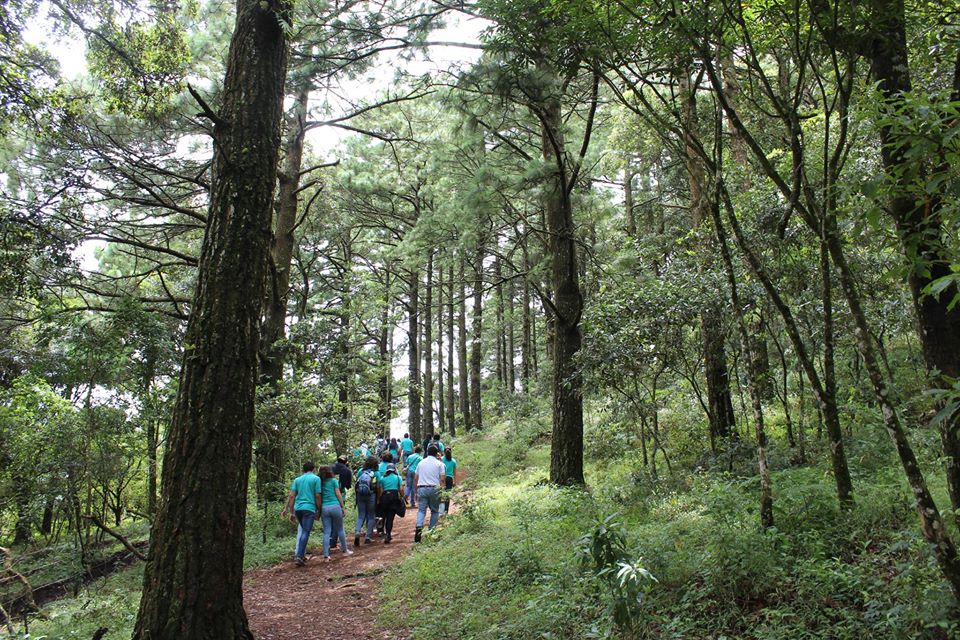
Volunteers in Nicaragua. Source: Font: Angélica Duarte.
Despite all the different scenarios that occur in volunteer tourism, learning for both parties is one of the great fruits of this tourism model. On the one hand, the living conditions of the communities have changed as the volunteers’ arrivals are more often, not only due to the economic contribution that is considerably high for the socioeconomic level of the families in rural Nicaraguan spaces, but also for the exchange of knowledge and practices that occur in the daily activities carried out together with the volunteers. As one of the members of Asocación Puesta del Sol comments: “I know the world through them, although I have never left the country. They tell me about how life is in their countries, their food, their culture. In general, it is really an experience that fills me a lot” (María José Cerda, personal interview, December 2019).
Final thoughts, how will COVID-19 affect voluntourism in Nicaragua?
Despite its different practices and the criticism that volunteer tourism has received in recent years for its growing process of commercialization, this is clearly a niche market far from traditional mass tourism. With this in mind the situation of the COVID-19 pandemic, there is no clear perspective on how it will affect voluntourism, especially in summer, when it is when more programs are held. On the one hand, international travel has been reduced because of sanitary policies enacted in each country, a fact that will decrease the number of volunteer tourists. Specifically, the volunteers promoted by student mobility programs will be more affected, since the pandemic has altered school cycles and vacation periods globally and a large part of the calls are closed for this year. Therefore, some institutions could receive financial support from global economic entities for the execution of volunteer projects, such as those managed by international cooperation agencies that focus on health issues for more vulnerable countries, as is the case of Nicaragua.
The partial or total reduction of the number of voluntourists may also affect the communities that depend on these programs and the agencies that develop them. Therefore, this is a good time to rethink the role of these organizations and the management they do on volunteering and try to make the communities manage their own projects, as we have seen in some examples from Nicaragua. Likewise, it is also interesting that the volunteers themselves question their motivations and their need of travelling internationally to develop many of the skills for which they intend to do voluntourism, at a time when travel will be limited. In conclusion, taking into account this COVID-19 crisis, volunteer tourism in Nicaragua and around the world can be a model to follow as long as it maintains its commitment to contributing to social well-being, in matters of health, education, food sovereignty and community development, with its main objective of alterity against the individualistic and consumerist visions of other types of tourism.
